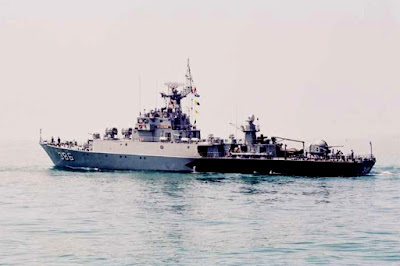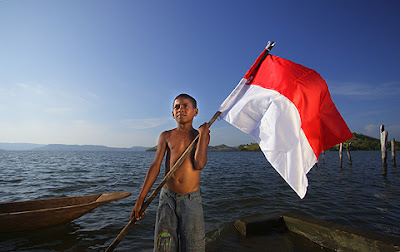Until today, many Australians deny the fact that Australia was a colonial power. Australia had Papua New Guinea as its colony before 1975 and Nauru before 1968. They think Australia is a country that always fights for freedom. That is why many hypocritical Australians support West Papuan separatists and blame Indonesia for committing "genocide". On December 7, 1941, the Imperial Japan Navy suddenly attacked US Naval Station of Pearl Harbor. This surprise attack started World War II in Pacific theater. The Japanese advance was almost unstoppable. The Australian soldiers fought the Japanese invaders in New Guinea. The Australians mostly think their relationship with native New Guineans was in harmony. This photograph below is a well-known picture to Australian public even to the world.
Private George "Dick" Whitington being escorted by Fuzzy Wuzzy Angel Raphael Oimbari to a field hospital
"Fuzzy Wuzzy Angels" is name given by Australian soldiers to native Papuan carriers during New Guinea Campaign. The Australians nowadays highly praise them as heroes and they think these native carriers loved the Australians. What is not known by Australian public and the world is the fact that these "Fuzzy Wuzzy Angels" were forced labors. "Fuzzy Wuzzy Angels"' image as smiling natives who voluntarily came out of their villages to help the white men is a myth. These males were conscripted by Australian government. Because they were subjects to conscription, they would be punished if they tried to desert. They also suffered bad condition. Doctor Geoffrey Vernon described their condition during fighting on Kokoda Trail :
"... many carriers were without a single blanket, rice was practically the only food issue, meat was withheld for two or three weeks and tobacco scarce : the regulation governing the reduction of loads to 40 lbs was often ignored, and excessive weights and distances imposed on the carriers as if they were merely pack animals."
About two-thirds of the "Fuzzy Wuzzy Angels" had tried to escape as said by Ulli Beier, a teacher from PNG University, who spoke to surviving carriers in the 1960s. Whenever these forced labors got away, the Australians would conscript their sons so the fathers would be forced to return and face the punishments. The most terrifying punisments remembered by the survivors were "drum beatings" in Kerema. A fire was lit on a 44-gallon drum and when it was hot the deserters were put across the drum and beaten. In some villages, the Australians took all fit adult males. It caused these villages had no people to clean the gardens, hunt animals, and maintain houses and canoes. Some places faced near starvation and very high infant mortality.
From native point of view, living under Australian rule was not better than under the Germans. Since the beginning of Australian rule, they have already known what white people's rule was like. According to David Marsh, former district commisioner, the natives were forbidden to drink alcohol, could not go to picture show with Europeans, and had to move aside when walking on a footpath as regulated under Native Regulations and Ordinances in Papua. Twelve years before World War II, the black labors struck in Rabaul. Their complaint for not getting breakfast caused the white masters became outraged. The white cops put the strike leaders to trial and the white magistrate decided to jail them all.
Some native Papuans decided to collaborate with the Japanese fighting the Allied forces. Emboge, a chief in the Buna area, was one of the native Papuans who was recorded for collaborating with the Japanese during World War II. Emboge was recorded for handing over May Hayman and Mavis Parkinson, two missionary sisters from Australia, to the Japanese soldiers. The sisters were bayoneted to death near present day Popondetta. When Japan's treatment to the natives getting worse, he attempted to build independent struggle. Emboge and 15 other Papuans were arrested and hanged by the Australians. Alan Powell on his book "The Third Force : ANGAU's New Guinea War, 1942-46" quoted Emboge's statement before his execution :
"The kiawa (white men) treated us badly before the war and they deserted the people when the Japanese landed at Buna. We tried the Japanese but we did not like them at all. So all we could do is organise ourselves and settle our own differences before we can hope to fight the external enemies."
Seven mission workers were also killed by the Japanese soldiers and pro Japanese native Papuan. One of seven mission workers, Lucian Tapiedi, was killed by a native, Hivijapa, by an axe. The rest were handed over by him to the Japanese and beheaded at Buna Beach. Hivijapa believed that time for the Europeans had ended. The European coastwatchers also became killing targets of the natives. A party of Sengam tribesmen led a Japanese patrol to Maibang and caused the European coastwatchers escaped. A Gira tribesman led the Japanese soldiers in an abortive raid on the coastwatchers on the inland east bank of Nankina. A Sengam tribesman persuaded the Sibog tribesmen to kill three coastwatchers in the interior.
This truth is buried so deeply by both Australian government and PNG government. This truth is also covered by heartless and money-oriented Benny Wenda and his ULMWP (United Liberation Movement for West Papua). As Papua New Guinea can be considered "Australia's satellite state", the story of Emboge's struggle against Australian colonialism is forgotten while the myth of helpful "Fuzzy Wuzzy Angels" comes to surface. Benny Wenda at his FWPC page on Facebook used "Fuzzy Wuzzy Angels" myth to get sympathy from Australian public. He encouraged the Australians to help his struggle to "free" West Papua because the Papuans already helped them during World War II. If Benny Wenda were true independence fighter, he should speak about Australia's hidden brutality over his brothers and sisters on the eastern side of his island. Australia is the true evil empire in South Pacific.






































